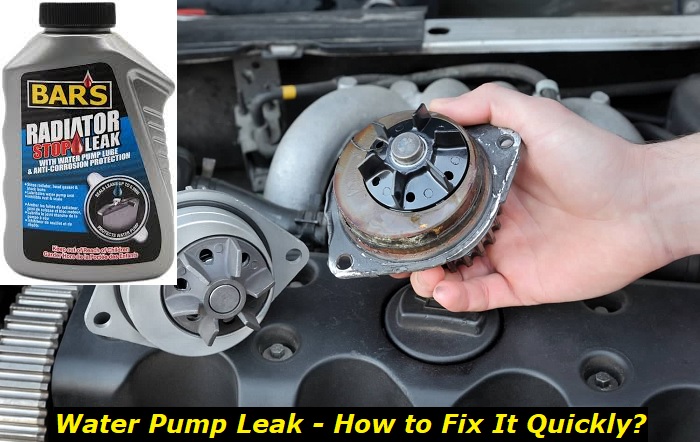Water pump leaks can be hard to diagnose and fix, especially if you don't have the right tools on hand. Fortunately, with a few simple steps, you can get your vehicle running safely enough so that it will make it to the repair shop without any problems.
Cooling equipment problems highlights
- Level of urgency:medium
- Commonreasons:low-quality antifreeze, age, mileage, damage
- DIY diagnostics:very complicated
- DIY repair:impossible
- Price of repair:$350 - $850
- Time for repair:3 - 10 hours
- If ignored:engine overheating, bad coolant leaks, equipment damage

What are the causes of water pump leaks?
Common causes of water pump leaks include worn seals, damaged gaskets, and loose bolts. Seals can wear out over time due to the continuous movement of parts in the pump's assembly. Gaskets are thin layers of material that provide a seal between two components, such as a cover and an opening.
Loose bolts may be caused by improper installation or a lack of maintenance. Also, if the pump is not regularly serviced and lubricated, dirt particles can enter the system, leading to leaks. In some cases, leaking may also be caused by a broken impeller, which is a moving part in the water pump that helps draw water from its source into the system.
Finally, rust and corrosion can cause leaks in the pump housing as well. It is important to regularly inspect the water pump for any signs of leakage and repair any issues as soon as they are detected. This will help ensure that your water pump is running efficiently and safely.
What can happen if you don't fix the water pump leak immediately?
If you ignore a water pump leak, it can eventually lead to major damage to your vehicle and cause serious safety issues. A leaking water pump can cause coolant loss, which can lead to engine overheating.
This is especially dangerous if the coolant is hot enough to vaporize, as it could create steam in the engine causing severe internal damage. The leak itself can also cause the engine to overheat, as well as damage to other parts of the cooling system. If a water pump is leaking for long enough, it could even cause an entire engine failure.
How long can you drive with a leaking water pump?
The answer to this question depends on the severity of the leak and how fast you are losing fluid. If the leak is minor, then you may be able to drive for a few days before needing to repair it.
However, if the leak is more severe, then it is best to get it fixed as soon as possible in order to avoid any major damage. Remember that it is not recommended to drive more than 10 miles, even if a leak is minor and you have already applied a temporary fix.
How to fix the water pump leak
1) Inspect the leak area
First, inspect the area where the leak is coming from. Check for any loose clamps or hoses and make sure that there are no signs of deterioration in the materials, such as cracks or holes.
If there is significant damage, then it may be best to call a tow truck and have your vehicle taken to the repair shop right away. If the leak appears to be minor, then it's time to assess what kind of temporary fix you can make.
2) Find an industrial sealant, epoxy, or stop-leak product
Start by purchasing some quick-drying industrial sealant or epoxy from your local auto parts store. It is important that you use a sealant specifically formulated for water pumps, as this will ensure that the seal is strong enough to withstand the pressures of a working water pump.
If you have a stop-leak product on hand, you can use this as well. However, it's important to keep in mind that these products are only meant for minor leaks and should not be used as a long-term fix.
3) Apply the sealant or stop-leak product
Once you have your sealant, carefully apply it to the leaking area and allow it to dry completely. Be sure to follow all manufacturer instructions when applying any type of sealant or epoxy.
Stop-leak products are usually poured directly into the radiator and can be left to do their job for a few hours before being flushed out. If done correctly, this should provide you with a temporary fix that will last until you can get to the repair shop and have it fixed properly.
4) Drive to the repair shop
Once the sealant has dried completely, you can now safely drive your vehicle to the repair shop and have them professionally assess and repair any issues with your water pump. Be sure to drive carefully and keep an eye out for any further signs of leakage, as this could indicate a more serious problem that needs to be addressed immediately.
It's important to drive slowly, as a leaking water pump can cause your engine to overheat, which could lead to further damage. If your car is overheating too much, make a stop and wait for the engine to cool down before continuing on.
By following these steps, you should be able to temporarily fix your water pump leak safely enough so that it will make it to the repair shop without any problems. Remember, this is just a temporary solution and should not be seen as a permanent repair. You will likely need to replace the water pump entirely for a complete and lasting repair. So, be sure to take it into the shop as soon as possible.
How to prevent water pump leaks?
The best way to prevent water pump leaks is to inspect and maintain the pump regularly. Check for signs of wear or damage, such as cracks, dents, or rust. Make sure all the seals and hoses are in good condition and replace them if necessary.
Regularly checking the fluid levels can help identify any small leaks before they become bigger problems. Additionally, using a higher quality pump with better seals and gaskets can help reduce the chance of leaks. Finally, make sure to use the correct grade of oil or coolant for your pump to ensure optimal performance.
With proper maintenance and careful attention to detail, you can keep your water pump running without any major issues.
What is the price of a new water pump?
The price of a new water pump can vary greatly depending on the make and model of your vehicle. Generally, you will be looking at anywhere between $50 and $500, with more complex models and higher-end vehicles being on the more expensive side.
However, it is always best to consult with a certified mechanic to get an accurate assessment of the costs associated with replacing your water pump. Additionally, it is important to remember that labor and installation costs may also be included in the overall price. So, be sure to factor those into your budget as well. With proper care and maintenance, your new water pump should last for many years to come.
Bottom Line
A water pump leak can cause serious damage to your vehicle and is something that should not be ignored. If you detect a water pump leak, inspect the area for any visible signs of damage, find an industrial sealant or epoxy from your local auto parts store, apply it carefully and drive slowly to the repair shop.
This will help ensure that your water pump is running efficiently and safely. Don't hesitate to get it fixed as soon as possible in order to avoid further damage or safety risks.
About the authors
The CarAraC research team is composed of seasoned auto mechanics and automotive industry professionals, including individuals with advanced degrees and certifications in their field. Our team members boast prestigious credentials, reflecting their extensive knowledge and skills. These qualifications include: IMI: Institute of the Motor Industry, ASE-Certified Master Automobile Technicians; Coventry University, Graduate of MA in Automotive Journalism; Politecnico di Torino, Italy, MS Automotive Engineering; Ss. Cyril and Methodius University in Skopje, Mechanical University in Skopje; TOC Automotive College; DHA Suffa University, Department of Mechanical Engineering






Add comment